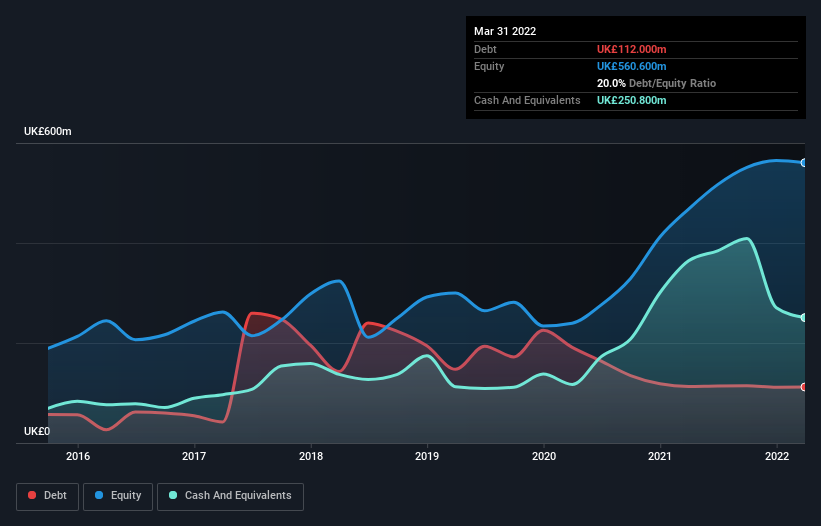
Legendary fund manager Li Lu (who Charlie Munger backed) once said, 'The biggest investment risk is not the volatility of prices, but whether you will suffer a permanent loss of capital.' So it might be obvious that you need to consider debt, when you think about how risky any given stock is, because too much debt can sink a company. As with many other companies Kindred Group plc (STO:KIND SDB) makes use of debt. But the real question is whether this debt is making the company risky.
What Risk Does Debt Bring?
Generally speaking, debt only becomes a real problem when a company can't easily pay it off, either by raising capital or with its own cash flow. If things get really bad, the lenders can take control of the business. However, a more frequent (but still costly) occurrence is where a company must issue shares at bargain-basement prices, permanently diluting shareholders, just to shore up its balance sheet. Having said that, the most common situation is where a company manages its debt reasonably well - and to its own advantage. The first thing to do when considering how much debt a business uses is to look at its cash and debt together.
View our latest analysis for Kindred Group
How Much Debt Does Kindred Group Carry?
The chart below, which you can click on for greater detail, shows that Kindred Group had UK£112.0m in debt in March 2022; about the same as the year before. But it also has UK£250.8m in cash to offset that, meaning it has UK£138.8m net cash.

A Look At Kindred Group's Liabilities
Zooming in on the latest balance sheet data, we can see that Kindred Group had liabilities of UK£445.3m due within 12 months and liabilities of UK£216.7m due beyond that. Offsetting this, it had UK£250.8m in cash and UK£171.3m in receivables that were due within 12 months. So it has liabilities totalling UK£239.9m more than its cash and near-term receivables, combined.
Given Kindred Group has a market capitalization of UK£1.68b, it's hard to believe these liabilities pose much threat. However, we do think it is worth keeping an eye on its balance sheet strength, as it may change over time. Despite its noteworthy liabilities, Kindred Group boasts net cash, so it's fair to say it does not have a heavy debt load!
But the other side of the story is that Kindred Group saw its EBIT decline by 7.8% over the last year. That sort of decline, if sustained, will obviously make debt harder to handle. There's no doubt that we learn most about debt from the balance sheet. But ultimately the future profitability of the business will decide if Kindred Group can strengthen its balance sheet over time. So if you want to see what the professionals think, you might find this free report on analyst profit forecasts to be interesting.
Finally, a company can only pay off debt with cold hard cash, not accounting profits. Kindred Group may have net cash on the balance sheet, but it is still interesting to look at how well the business converts its earnings before interest and tax (EBIT) to free cash flow, because that will influence both its need for, and its capacity to manage debt. During the last three years, Kindred Group generated free cash flow amounting to a very robust 90% of its EBIT, more than we'd expect. That puts it in a very strong position to pay down debt.
Summing Up
While Kindred Group does have more liabilities than liquid assets, it also has net cash of UK£138.8m. And it impressed us with free cash flow of UK£144m, being 90% of its EBIT. So we are not troubled with Kindred Group's debt use. The balance sheet is clearly the area to focus on when you are analysing debt. But ultimately, every company can contain risks that exist outside of the balance sheet. For example, we've discovered 2 warning signs for Kindred Group (1 shouldn't be ignored!) that you should be aware of before investing here.
At the end of the day, it's often better to focus on companies that are free from net debt. You can access our special list of such companies (all with a track record of profit growth). It's free.
Valuation is complex, but we're here to simplify it.
Discover if Kindred Group might be undervalued or overvalued with our detailed analysis, featuring fair value estimates, potential risks, dividends, insider trades, and its financial condition.
Access Free AnalysisHave feedback on this article? Concerned about the content? Get in touch with us directly. Alternatively, email editorial-team (at) simplywallst.com.
This article by Simply Wall St is general in nature. We provide commentary based on historical data and analyst forecasts only using an unbiased methodology and our articles are not intended to be financial advice. It does not constitute a recommendation to buy or sell any stock, and does not take account of your objectives, or your financial situation. We aim to bring you long-term focused analysis driven by fundamental data. Note that our analysis may not factor in the latest price-sensitive company announcements or qualitative material. Simply Wall St has no position in any stocks mentioned.
About OM:KIND SDB
Kindred Group
Operates an online gambling business in Europe, North America, and Australia.
High growth potential with excellent balance sheet.
Similar Companies
Market Insights
Community Narratives



